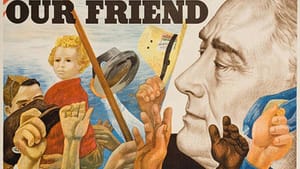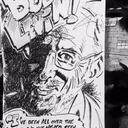Stay in the Loop
BSR publishes on a weekly schedule, with an email newsletter every Wednesday and Thursday morning. There’s no paywall, and subscribing is always free.
Several million dollars for your thoughts
From the New Deal to Citizens United

I may have been unkind to the Supreme Court.
I had been calling Citizens United the most wereweasel-bit decision of the past 50 years in its likely social devastation. I had it bunked between Dred Scott and Korematsu in the jurisprudential Hall of Shame. By okaying corporations to dump unlimited cash sacks into the back pockets of electoral candidates, it seemed to have laid its crop against the flanks of the rich, goading them to trample our last pretensions to representative democracy.
But perhaps I was mistaken. Maybe Citizens just confirmed what America had already become. After all, look what loathsome flotsam our democracy has heaved up on our shining shores in my lifetime alone. Tailgunner Joe McCarthy, George (“The Doorjam”) Wallace, that yutz who costarred with the chimp in Bedtime for Bonzo, and Dick Cheney, that walking-talking argument against Intelligent Design.
The Dixiecrat legacy
In his invigorating analysis of the New Deal, Fear Itself, Ira Katznelson argues that mid-20th century Southern Democrats shaped who we are today. Since these grits-eaters constituted the majority of his party in Congress, Franklin D. Roosevelt needed their support to get his agenda passed. And while even the foulest of this crop, like the Ku Klux Klansman Theodore Bilbo and the “Nigger-this, Kike-that” John Rankin, were progressives in many ways, they had this blind spot, albeit one about the size of the Vredefort Crater. So to land their votes, Roosevelt had to gut his programs of anything that might benefit Southern blacks and threaten the segregationist way of life. Thus legislation was drafted to insure that programs were controlled by local governments rather than Washington, insuring that Dixie’s blacks would be barred from them. As a result, domestics and agricultural workers, most of whom throughout the South were black, were excluded from minimum-wage-and-maximum-hour laws, as well as from Social Security, redistributing wealth away from them and burying them in poverty for additional generations.
Southern congressmen were crucial again in enabling Roosevelt to prepare the United States for World War II against bipartisan isolationist opposition. (The first peacetime draft in the nation’s history, created in 1940, was renewed, just four months before Pearl Harbor, by 203-202 in the House, with the South voting 123-8 in favor.) But during the war, an effort to make it easy for servicemen to vote was defeated by these same Southerners because they feared what giving blacks access to the ballot might mean when they returned to Dixie.
Once America entered the conflict, Roosevelt had forged a federally directed alliance between corporations and labor unions, under the National Resources Planning Board, to unify the country in the waging of war. He hoped that a similarly shared sense of purpose could carry over into peacetime and be directed toward achieving social justice.
But even before Germany had surrendered, Southern Democrats, fearing what federal interference might mean for seperate-but-far-from-equal, collaborated with dog-eat-dog, Spencerian free-market Republicans to dismantle the NRPB. Then, perceiving unions as a progressive force, this coalition passed the Taft-Hartley Act to cripple organized labor. The result, Katznelson says, was to set America on a path of specialized interest groups fighting one another, regardless of national interest, for pieces of whatever pies were in the oven. (If you think I’m talking ancient history, I direct you to Elizabeth Drew’s “Republicans: Divided & Scary,” lamenting the efforts of the GOP — in which former Southern Democrats have been reborn as a crucial component — to get programs out of federal and into state hands, while resisting efforts to achieve racial “equity” and waging a “bitter fight” to bust unions.)
The prophet Gecko
Our society seems — and here’s an understatement — to honor wealth unduly. Television shows and newspaper supplemental sections trumpet the life “styles,” not the life-worth, of the rich. Gordon Gecko’s flip “Greed is good” has become an inspirational slogan, not a character-riddling condemnation. Entrepreneurship and making a first billion, not service or the assisting of one’s neighbor, are the carrots dangling before this generation’s best and brightest. (They then proclaim their attainment of this status by simultaneously possessing mansions in Malibu, chalets in Aspen, and block-wide condos on Central Park West. Their driveways hold cars that cost several times more than most people’s homes, and from their wrists dangle watches that cost more than most cars.) “The one at the end with the most toys wins” has evolved from a bumper sticker to a marching tune, no matter how many people are exploited or how much the planet is ravaged to amass them.
So Citizens United could’ve nailed it. Maybe the most moneyed should have the most say in who runs us. They have succeeded, after all, at what most of us most crave. They are the gods who walk among us. They have proved themselves the philosopher/kings by whom we should be led.
What else can explain that Trump turnip still being a contender?
Sign up for our newsletter
All of the week's new articles, all in one place. Sign up for the free weekly BSR newsletters, and don't miss a conversation.

 Bob Levin
Bob Levin